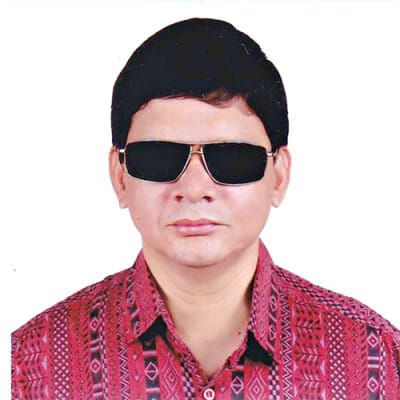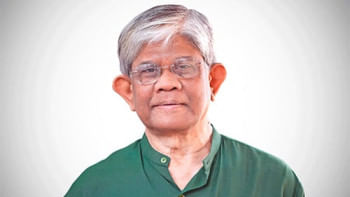Ray in the darkness

Those with disabilities in the country have long faced societal barriers, negative perceptions, and discrimination, and 53-year-old Md Saidul Huq was no exception.
Saidul lost his vision due to typhoid when he was just six years old and the challenges he faced in his education drove him to form Blind Education and Rehabilitation Development Organisation (BERDO) in 1991.
His mission was to ensure equal access, active participation, and a dignified life for those with disabilities by empowering and mainstreaming them in society.
From his earliest days in a school for visually impaired children in his hometown of Barishal, Saidul felt the overall education system was not in favour of students like him.
Even at the special school, there were no braille books, no trained teachers, and more importantly, no inspiration for the students.
Although he was soon brought to Dhaka by an acquaintance of the family to be admitted to an NGO-run primary school which taught using braille, Saidul had to return to Barishal for his secondary and higher secondary studies in the mainstream system.
He went on to finish school and was admitted to study philosophy at the University of Dhaka in 1988 where despite limitations relating to scribes and supporting materials like books and records, he impressed with his merit.
While studying for his bachelor's degree, he first aspired to do something for those who were visually impaired -- for whom there seemed to be no books, jobs, or prospects.
"When I started, I had no funds, staff, or office space. All I had was my self-confidence," said Saidul.
That confidence, this year, helped BERDO step into its 30th year.
While BERDO started with the idea of a library with braille and audiobooks for the visually impaired -- over time, it has evolved into an organisation working with people with other disabilities as well.
In 2006, BERDO established a residential school for visually impaired children to study at the primary level free of cost. Currently, around 50 students are studying in braille from the first to fifth grade.
After the fifth grade, BERDO helps these students integrate into mainstream schools and provides them with necessary books and other learning materials.
Today, many of these students are studying at various public universities.
Md Anowar Hossain, currently a 3rd-semester student of Islamic studies at the University of Dhaka, was born visually impaired. His parents initially admitted him to the Hifz department of a local madrasah in Mirpur, where students memorise the Holy Quran through rote-learning, as they weren't aware of braille education.
When they heard about BERDO, Anowar was admitted there. "One thing I will say is that BERDO gifted me the light of education which I didn't have before and it has brought about the most significant changes in my life. Otherwise, I might not have gotten admitted to DU."
BERDO's library is equipped with around 500 braille books and 300 audio cassettes and CDs containing curriculum books, children's books, story books, poetry, and novels.
It also has a recording studio -- where university students voluntarily record books which are not in braille -- as well as a computer lab which helps its students develop their computer and ICT skills with the help of screen-reading software.
Considering how scarce braille books were for Saidul and his contemporaries, BERDO also set up a braille book production centre. After BERDO printed 67 sets of braille books for eighth graders under the National Curriculum and Textbook Board (NCTB) last year, they received an order for NCTB braille books for 860 students in grades one through 10 this year.
The organisation is also helping to connect differently abled people with appropriate employment opportunities and income-generating activities.
"We have already managed jobs for around 250 people with disabilities in various banks, corporations, educational institutions, and other private companies," said Saidul.
For the past nine years, visually impaired 40-year-old Mst Monju Akter has worked as an information officer at Daffodil International University -- a position BERDO helped her find.
Physically disabled 53-year-old Md Abdul Hai, who lost a leg due to illness, was trained and given Tk 1 lakh with which he bought an auto-rickshaw and earns a living by driving for fares and doing repair work at an auto-rickshaw garage.
Hai also trains other people with disabilities, who once begged on the streets, to earn a living by doing minor repair work and maintenance of auto-rickshaws.
The organisation itself employs 13 people with disabilities, most of who have been working there for decades.
Back in 1993, Saidul was made an Ashoka Fellow in recognition for his contribution for the people with disabilities. In June last year, BERDO received national recognition from the government for its outstanding contribution to the betterment of people with disabilities.
Saidul aspires to expand his work to all 64 districts of the country, have a braille press so that large numbers of braille books can be churned out, and set up a separate residential school for visually impaired girls.
"We also want to establish a technical training centre for people with disabilities, so that those who don't have education can work and earn money such as in bookbinding, notebook binding, and braille book production."

 For all latest news, follow The Daily Star's Google News channel.
For all latest news, follow The Daily Star's Google News channel. 



Comments